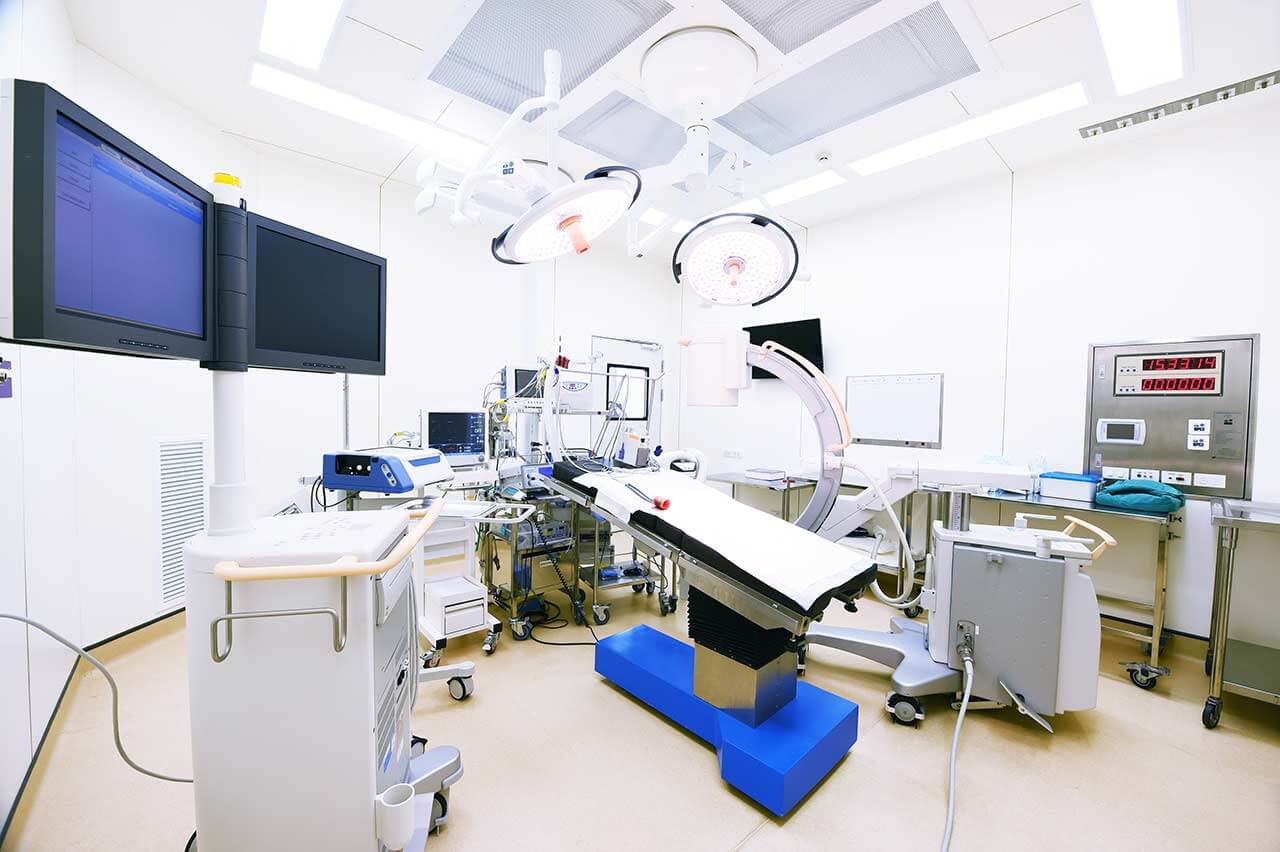
The program includes:
- Initial presentation in the clinic
- clinical history taking
- review of medical records
- physical examination
- laboratory tests:
- complete blood count
- general urine analysis
- biochemical analysis of blood
- TSH-basal, fT3, fT4
- tumor markers
- inflammation indicators (CRP, ESR)
- indicators of blood coagulation
- abdominal ultrasound scan
- CT scan/MRI or PET-CT of abdomen
- preoperative care
- cytoreductive surgery to remove visible tumors
inside the abdomen and HIPEC - histological and immunohistochemical
examination of removed tissues - symptomatic treatment
- cost of essential medicines
- nursing services
- stay in the hospital with a full board
- accommodation in a 2-bedroom ward
- elaboration of further recommendations
How program is carried out
During the first visit, the physician will conduct a clinical examination and go through the results of the available diagnostic tests. After that, you will undergo the necessary additional examination, such as the assessment of liver and kidney function, ultrasound scan and tomography of the abdominal organs. Based on the results of the examination, the physician will choose the surgical technique and the type of anesthesia. After that, preparation according to the preoperative standard will start.
Cytoreductive surgery begins with general anesthesia. The intervention is performed as open surgery, i.e. through the incision in the anterior abdominal wall, so that the surgeon can carefully examine the peritoneum and the surface of the abdominal organs. The surgeon removes affected by the malignant process ovaries, areas of the peritoneum and metastases in other internal organs. This stage of the operation can take several hours, since the overall effectiveness of the treatment depends on the completeness of the malignant tissues removal.
At the next stage of the operation, the surgeon inserts several catheters into the abdominal cavity. Through the catheters, a heated solution of a chemotherapy drug is pumped inside. The special system maintains the required temperature (42-43 degrees Celsius), pressure and circulation rate of the medicinal solution. The solution mechanically flushes out blood clots and remnants of malignant tissues, and a heated chemotherapy drug destroys micrometastases in internal organs and lymph nodes (micrometastases can’t be detected by the naked eye).
After 1-1.5 hours, the chemotherapy drug is removed from the abdominal cavity and the abdominal cavity is washed with saline. After that, the surgeon removes the catheters and sutures the incision of the anterior abdominal wall.
After the completion of the operation, you will be transferred to the ward of the intensive care unit, under the round-the-clock supervision of doctors and nurses. In 1-3 days after the operation, your drains will be removed and you will be transferred to a regular ward for further recovery. The whole treatment takes 10-12 days on average.
Finally, the attending physician will evaluate the results of control examinations, schedule the date of discharge from the hospital and give you detailed recommendations for further follow-up and treatment.
Required documents
- Medical records
- MRI/CT scan (not older than 3 months)
- Biopsy results (if available)
Service
You may also book:
 Price:
Price:
About the department
The Department of Gynecology and Gynecologic Oncology at the University Hospital Bonn offers the full range of modern diagnostics and treatment of various diseases of the female reproductive system. Of particular interest is the surgical treatment of malignant diseases of the female reproductive organs. The department also specializes in the conservative and surgical treatment of inflammatory processes, benign tumors. The department's doctors have in their arsenal a variety of minimally invasive surgical techniques with the use of laparoscopy and hysteroscopy, which contributes to the most sparing and safe therapeutic process. An integral part of clinical practice is urogynecology, in particular the treatment of urinary incontinence and pelvic organ prolapse. The department is headed by PD Dr. med. Mignon-Denise Keyver-Paik.
The department is proud of its exceptional competence in the treatment of cancer of the female reproductive organs (uterine, cervical, ovarian, fallopian tube cancer, etc.). To ensure the highest level of medical care in this field, the department has established the Cancer Center, which was certificated by the German Cancer Society for its high treatment success rates. In addition, the department is part of the Center of Integrated Oncology Cologne-Bonn funded by the German Cancer Aid (Deutsche Krebshilfe). Thus, the department has created optimal conditions for the effective treatment of oncopathologies of the female reproductive system. The department is one of the most reputable medical facilities of this kind in Germany and Europe.
Special attention should be paid to the high-tech equipment of the department, which allows the doctors to provide the extremely accurate diagnostics in the slightest changes in the female reproductive organs and minimally invasive treatment of such pathological disorders. The advantage of minimally invasive surgery is fast recovery after surgery, lack of damage to healthy tissues, minimal risk of postoperative infections and complications, minimal pain. A great number of these interventions are performed on an outpatient basis. Also, the department's specialists widely apply laparoscopic methods, for example, during the hysterectomy, removal of cervical malignant neoplasms or uterine extirpation. Since December 2018, the progressive minimally invasive interventions are performed in the department using the da Vinci surgical system, which ensures the phenomenal accuracy during the operation, up to millimeters.
The main clinical focuses of the department include:
- General gynecology
- Treatment of uterine fibroids
- High-intensity focused ultrasound (HIFU)
- Uterine artery embolization
- Treatment of urinary incontinence and pelvic organ prolapse (within the specialized center, certified by the German Continence Society)
- Treatment of cervical dysplasia
- Minimally invasive surgery
- Laparoscopy (for example, in pains, adhesions in the lower abdomen, hysterectomy, malignant uterine, cervical tumors, etc.)
- Minimally invasive surgery using the state-of-art da Vinci surgical system
- Treatment of uterine fibroids
- Treatment of gynecologic cancers (on the basis of the specialized Cancer Center and Center of Integrated Oncology Cologne-Bonn)
- Uterine cancer
- Cervical cancer
- Ovarian cancer
- Fallopian tube cancer
- Vulvar cancer (external genital organs)
- Other types of cancer in women
- Chemotherapy (including hyperthermic intraperitoneal chemotherapy)
- Surgical treatment
- Supportive therapy
- Other gynecological diseases and treatment options
Photo of the doctor: (c) Universitätsklinikum Bonn
About hospital
According to the authoritative Focus magazine, the University Hospital Bonn ranks among the top ten medical facilities in Germany!
The hospital was opened on January 1, 2001, although in fact it inherits the medical facility, which operated at the Faculty of Medicine of the University of Bonn. The hospital in Germany combines all the highest standards of modern university medicine of the international level. A highly competent team of experienced physicians, which consists of more than 8,000 employees from various fields, takes care of the patients’ health.
The hospital has 32 specialized departments and 23 institutes, which implement the highest standards of treatment in Germany. On their basis, in addition to the successful clinical activities, the productive research and training of young specialists are carried out. Also, the hospital has 10 intensive care units and more than 30 cutting-edge operating rooms. They are equipped with the advanced surgical, navigation and monitoring systems, which provide sparing and the most effective surgical treatment. The total number of places for hospitalization is 1,250 beds.
The hospital presents all fields of medicine, while many of them are awarded by prestigious German and international certificates. For example, in 2007, the Comprehensive Cancer Center of the hospital became one of the four winners at the nationwide competition among Cancer Centers of Excellence. The research focuses primarily on the clinical genetics and genetic epidemiology, neurology, immunology and infectiology, hepatology and gastroenterology, and diseases of the cardiovascular system. The research findings contribute to the development of new therapeutic methods and overall improvement of treatment in Germany.
The main value for all employees of the hospital in Germany is human health, his individual needs and wishes, therefore, despite the high-tech infrastructure, the focus remains on the human attitude and respect for each patient.
Photo: (с) depositphotos
Accommodation in hospital
Patients rooms
The patients of the University Hospital Bonn live in cozy single, double and triple rooms, designed in bright colors. The standard room furnishing includes a comfortable bed with a remote control, a bedside table, a wardrobe, a table and chairs, as well as a TV and a telephone. Each patient room is equipped with an ensuite bathroom with toilet and shower. The hospital also provides enhanced-comfort rooms.
Meals and Menus
The patients of the hospital are offered tasty and balanced three meals a day: breakfast, lunch and dinner. Every day each meal features three different menus, including a vegetarian one. If you for some reason do not eat all the food, you will be offered an individual menu. Please inform the medical staff about your dietary preferences prior to the treatment.
Further details
Standard rooms include:
Religion
Christian priests are available for the patients at any time. Representatives of other religions may be requested at any time.
Accompanying person
Your companion may stay with you in your room or at a hotel of your choice during the fixed program.
Hotel
You may stay at the hotel during the outpatient program. Our employees will support you for selecting the best option.
The hospital offers a full range of laboratory tests (general, hormonal, tests for infections, antibodies, tumor markers, etc.), genetic tests, various modifications of ultrasound scans, CT scans, MRI and PET / CT, angiography, myelography, biopsy and other examinations. Treatment with medications, endoscopic and robotic operations, stereotaxic interventions is carried out here, modern types of radiation therapy are also used. The hospital offers patients all the necessary therapeutic techniques.
- Surgical treatment of the brain tumors, tumors of spinal cord and spine
- Replacement of all joints, resection arthroplasty
- Deep brain stimulation and vagus nerve stimulation in patients with epilepsy
- Multimodal complex treatment of Parkinson disease
- Thoracic endovascular aortic repair (TEVAR)
These are benign and malignant breast pathologies, malignant tumors of various localizations, neuromuscular diseases, stroke, retinal pathologies and various visual impairments, infertility, autoimmune diseases, epilepsy, coronary artery disease and myocardial infarction, leukemia and other pathologies.
- Ophthalmology
- Epileptology
- Reproductive medicine
- Hematology and oncology
- Neurosurgery
Over 8,000 highly qualified doctors and other employees work at the hospital.



